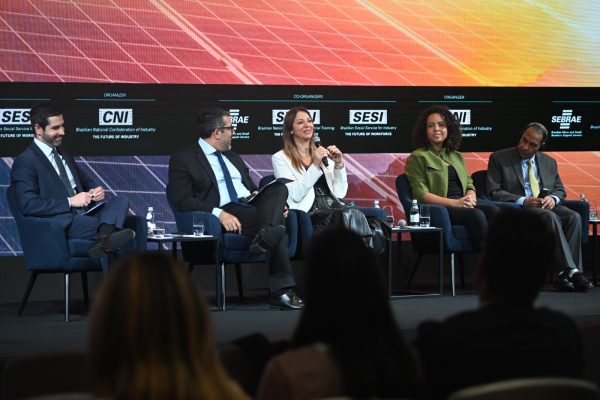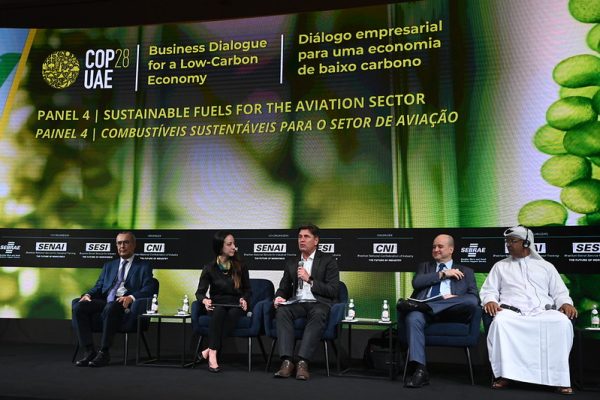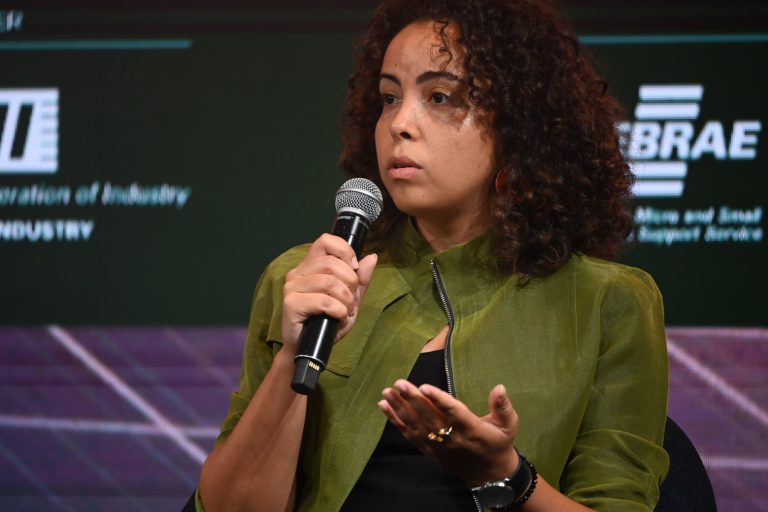Dubai – Arab-Brazilian Chamber of Commerce (ABCC) institutional relations director Fernanda Baltazar (pictured above) proposed that private sector organizations cooperate and hold talks to further concrete actions ahead of the UN climate summit COP30 to be held in Belém, Brazil, in 2025.

“COP30 will be held in Pará. We want to show more and more of what is being done, what can be done and what we can do in conjunction to get there. What can we really do in this sense, together? What agendas could we develop so that the next year have this dialogue between Brazilian and Arab parties? How could we, as representatives of these entities, work together and benefit all?” the director prompted during the panel on Low-Carbon Industry in Dubai.
Giving examples of what Arabs and Brazilian can do together, Baltazar proposed that Brazil supports countries in technology and good practices in agriculture. “Fostering sustainable agribusiness in North Africa, cooperating in solar and wind power in the Gulf,” she said.
The director spoke of the importance of mutually beneficial dialogue between the academic community and the private sector. “During COP27, the ABCC signed a memorandum of understanding with the universities of São Paulo (USP), Abu Dhabi, and Sharjah for research in sustainable food security, thinking on what we can do prior to the COP30,” she said. The COP27 took place in Egypt in 2022.
The panel took place during the event Business Dialogue for a Low-Carbon Economy held by industry group CNI on the sidelines of the COP28 and aimed sharing experiences of organizations that represented the private sector to contribute to the global transition towards a low-carbon economy.
Besides Fernanda Baltazar, panelists included Khush Choksy, senior vice president of International Member Relations at the U.S. Chamber of Commerce, Abrão Neto, CEO at Amcham Brasil, and Sossy Ingirkochian, Managing Director and head of Global Subsidiaries, and was moderated by Davi Bomtempo, executive manager of Environment and Sustainability at CNI.
Abrão Neto said that sustainability and decarbonization aren’t a problem of one company only. “It isn’t a challenge for one company or industry, it’s a challenge for all,” he said.
SAF
The afternoon saw the holding of the Sustainable Fuels for the Aviation Sector, with the purpose of presenting the potential of Brazil in making sustainable aviation fuels (SAF) and what has yet to be established so that the country becomes a hub and a reference for global airlines.

The talk moderated by CNI innovation director Jefferson Gomes featured energy lobby IBP CEO Roberto Ardenghy, Latam corporate, regulatory and sustainability affairs director Maria Elisa Curcio, Acelen new business vice president Marcelo Cordaro, and Alrais Enterprises Group CEO Ali Mohammad Ahmad Alrais.
Roberto Ardenghy said that the global SAF production is now at 300 million liters and is expected to reach 440 billion by 2050. He believes that a viable SAF has to be available, reliable and competitive. “The energy transition will be different for each country. We need to see how the market will get organized – this will be a major challenge. We need an available reliable product at socially acceptable prices so that there is no energy injustice,” he said.
Translated by Guilherme Miranda








